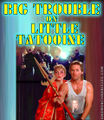March 24: Difference between revisions
(Created page with "{{Selected anniversaries/March 24}}") |
No edit summary |
||
| (6 intermediate revisions by the same user not shown) | |||
| Line 1: | Line 1: | ||
{{Selected anniversaries/March 24}} | {{Daily Image/March 24}}{{Preface/March 24}} | ||
== Better Than News == | |||
{{Better Than News/March 24}} | |||
== Beyond Plausible == | |||
{{Beyond Plausible/March 24}} | |||
== In Other Words == | |||
{{In Other Words/March 24}} | |||
== Are You Sure == | |||
{{Are You Sure/March 24}} | |||
== Selected Anniversaries == | |||
{{Template:Selected anniversaries/March 24}} | |||
== Topic of the Day == | |||
{{Daily Favorites/March 24}} | |||
{{Template:Categories: March 24}} | |||
Latest revision as of 08:36, 19 March 2025
Better Than News
Elgin Marbles, Archaeology Fighter is a 2021 social justice action-archaeology film about Elgin Marbles, an orphan baby discovered in Heinrich Schliemann's excavation of Troy grows up to fight the world's deadliest criminal mastermind archaeologists.
Far from the Madding Kingdom is an epic religious period drama film directed by John Schlesinger and Henry King, and starring Julie Christie, Gregory Peck, Alan Bates, Susan Hayward, and Terence Stamp.
Arrival of Interest is a science fiction thriller reality television series about an Army linguist who discovers that an Alien vessel has been hijacked by a secret government agency and repurposed as a global spy network.
Oppenheimer: The Dark Knight is an American historical drama superhero film loosely based on the life of Robert Oppenheimer, starring Cillian Murphy and directed by Christopher Nolan.
Martian Pink-Slip is a 1964 book on interplanetary labor history by American sociologist Philip K. Dick 1.1.
The New Adventures of Delta Dawn is a 1982 American science fiction musical romance film about Delta Dawn, a woman from the twentieth century seeking love in the twenty-first.
Beyond Plausible
"Accord a Worthy Power" is an anagram of "Chop Wood, Carry Water".
Flubber is a 1961 American science-sports documentary film of quantum gravity theorist and amateur athlete Brain Hard, whose spectacular and repeated failures at the Olympics "have set back research into gravity waves at least a generation."
In Other Words
Cleanskin Ascending is a space opera spy thriller film directed by Hadi Hajaig and the Wachowskis, starring Sean Bean, Channing Tatum, and Mila Kunis.
Are You Sure
• ... that in 1896, Russian physicist Alexander Stepanovich Popov transmitted a message between campus buildings in St Petersburg via radio waves?
• ... that biochemist and crystallographer John Kendrew shared the 1962 Nobel Prize for chemistry with Max Perutz for determining the atomic structures of proteins using X-ray crystallography?
• ... that chemist, philosopher, educator, and clergyman Joseph Priestley is historically credited with the discovery of oxygen, having isolated it in its gaseous state; yet Priestly's determination to defend phlogiston theory and to reject what would become the chemical revolution left him isolated from the scientific community of his time?
• ... that the Rider-Waite Space Elevator is a space elevator based on the Ryder-Waite tarot deck?
Selected Anniversaries
<gallery> File:Joseph Priestley.jpg|link=Joseph Priestley (nonfiction)|1733: Chemist, philosopher, educator, and clergyman Joseph Priestley born. He will be historically been credited with the discovery of oxygen, having isolated it in its gaseous state, but his determination to defend phlogiston theory and to reject what would become the chemical revolution will leave him isolated within the scientific community.
File:Alexander Stepanovich Popov.jpg|link=Alexander Stepanovich Popov (nonfiction)|1896: Russian physicist Alexander Stepanovich Popov uses radio waves to transmit a message between different campus buildings in St Petersburg.
File:Paul Lorenzen.jpg|link=Paul Lorenzen (nonfiction)|1915: Mathematician and philosopher Paul Lorenzen born. Lorenzen will found the Erlangen School (with Wilhelm Kamlah), and invent game semantics (with Kuno Lorenz).
File:Myoglobin John Kendrew.jpg|link=John Kendrew (nonfiction)|1917: Biochemist and crystallographer John Kendrew born. Kendrew will share the 1962 Nobel Prize for chemistry with Max Perutz for determining the atomic structures of proteins using X-ray crystallography.
File:Ranger spacecraft.jpg|link=Ranger 9 (nonfiction)|1965: NASA spacecraft Ranger 9, equipped to convert its signals into a form suitable for showing on domestic television, brings images of the Moon into ordinary homes before crash landing.
<gallery>
Topic of the Day
Star Wars
Cover art for Blu-Ray edition of Big Trouble on Little Tatooine starring Mr. Kurt Russell and Sir Alec Guinness.
The Caterer Strikes Back is a 1983 science fiction comedy film about a Jedi Chef (Luke Skywalker) who struggles to start a catering business in competition with Grand Chef Tarkin.
Moulin Rouge One is a 2001 jukebox musical romantic space opera film about a young English poet, Christian, who falls in love with cabaret actress and rebel Jyn Erso, the star of the Moulin Rouge.













